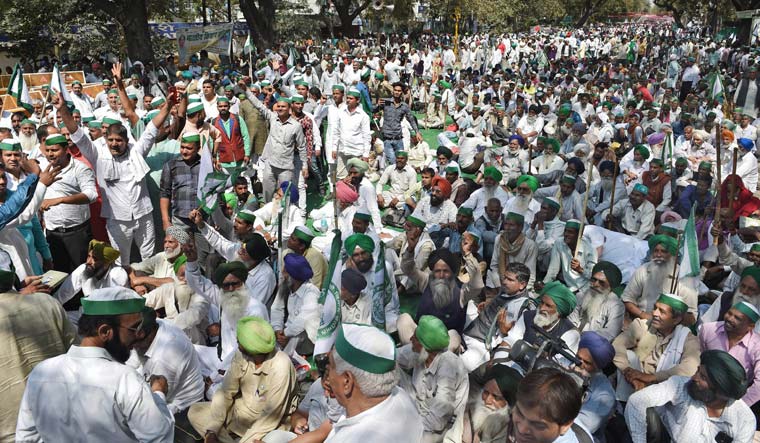Thousands of farmers, including Dalit, women and tribal peasants, would lay siege to the national capital on November 29 and 30. This would be their fourth, but definitely not the final march demanding a discussion on farmer's issues in the Parliament.
The farmers' movement gained a wider traction after seven farmers were shot dead while agitating outside a mandi in Mandasaur, Madhya Pradesh one-and-half years ago. The agitation in Mandasaur was part of a nationwide uprising of farmers after two consecutive drought years.
However, this time around the demand farmers put in front of the leader of the house and Prime Minister Narendra Modi is simple—hold a discussion on the two private members bills in the Parliament namely, Freedom Indebtedness Bill and Farmers Right to Guaranteed Remunerative Minimum Support Prices for Agricultural Commodities Bill.
The two Bills, together known as the Kisan Mukti Bills, were introduced in the Parliament as private member’s bills by Raju Shetti, Swabhimani Paksha MP from Maharashtra and K.K. Rajesh, Rajya Sabha MP from the Communist Party of India (Marxist), Kerala, in the monsoon session of the Parliament, earlier this year.
“We are going to tell Modiji on November 29 and November 30, that you either have a discussion and pass these two bills or leave," said V. M. Singh, convenor of the All India Kisan Sangharsh Co-ordination Committee (AIKSCC), an amalgamation of more than 200 farmers' unions across all states.
This farmer's protest platform has already received the support of 21 political parties, including some NDA partners in the past. The BJP has so far not supported the AIKSCC and the prime minister has refused to speak on the issue of farmers' distress in the Parliament so far.
"In the election rounds, we are now seeing the prime minister devote at least ten minutes to speak on farmers and at least three minutes on MSP. This is a positive development of our movement. For the first time, we are not just protesting over problems alone but also offering a solution ourselves. We just want Modiji to discuss and debate these Bills in the Parliament," said Singh.
For the first time, a cultural gala evening would also be organised at the Ram Lila Maidan by the farmers. Titled as 'Ek sham kisano ke naam' (one evening for farmers), the cultural gala would be attended by leading folk artists and troupes from Punjab, Odisha, Telangana, Maharashtra and North East on the evening of November 29.
On November 30, the farmers march onto Sansad Marg, where some months back they held a 'farmer's parliament' and moved a 'no confidence motion' against Prime Minister Modi.
Joining forces are also other non-farm organisations like the ex-servicemen. "Jawan is a kisan (farmer) in uniform. Every soldier is either a farmer or son of one,” said retired Major General Satbir Singh, who led the One Rank One Pay agitation for armed forces. Singh claimed that the then defence minister Arun Jaitley had denied their OROP claims after making promises before polls.
"Our 151 units of ex-servicemen would support the farmers' cause on November 29 and November 30 across their respective states. In addition, we will be present in full force during the Delhi march," said Singh, explaining his motivation to join the farmer's movement.
This time, Delhi's people have been appealed to play host to the protesting throngs of farmers who would arrive at the national capital after long days of travel.
“Farmer's distress has become our social distress and people realise it. In Mumbai, different people like small traders, residents, students, and even autorickshaw drivers chipped in to provide food and travel to the farmers. Doctors from Jamnalal Bajaj hospital came down to the streets to treat people," recalled Pratibha Shinde of Lok Sangharsh Manch, who conducted the farmer's march from Nasik to Mumbai, earlier this year.
"One small trader distributed chappals from his shop to farmers, as many were carrying on with bleeding feet. We expect Delhi wallahs would also open their hearts for farmers," said Shinde, with the hope that the organisers would be able to raise enough funds to support the protestors.
“Right now, we do not even have enough money to feed everyone,” said Yogendra Yadav, leader of Swaraj Abhiyan, and one of the AIKSCC members, to THE WEEK, when asked about the source of funds for the farmers' protest rally. More than 200 farmers' bodies in the country are raising their own funds to enable their representatives to travel to Delhi.
In July this year, farmers braved heavy downpour and sticky mud inside their tents at Ram Lila Maidan. This time, they would have to brave the winter.



